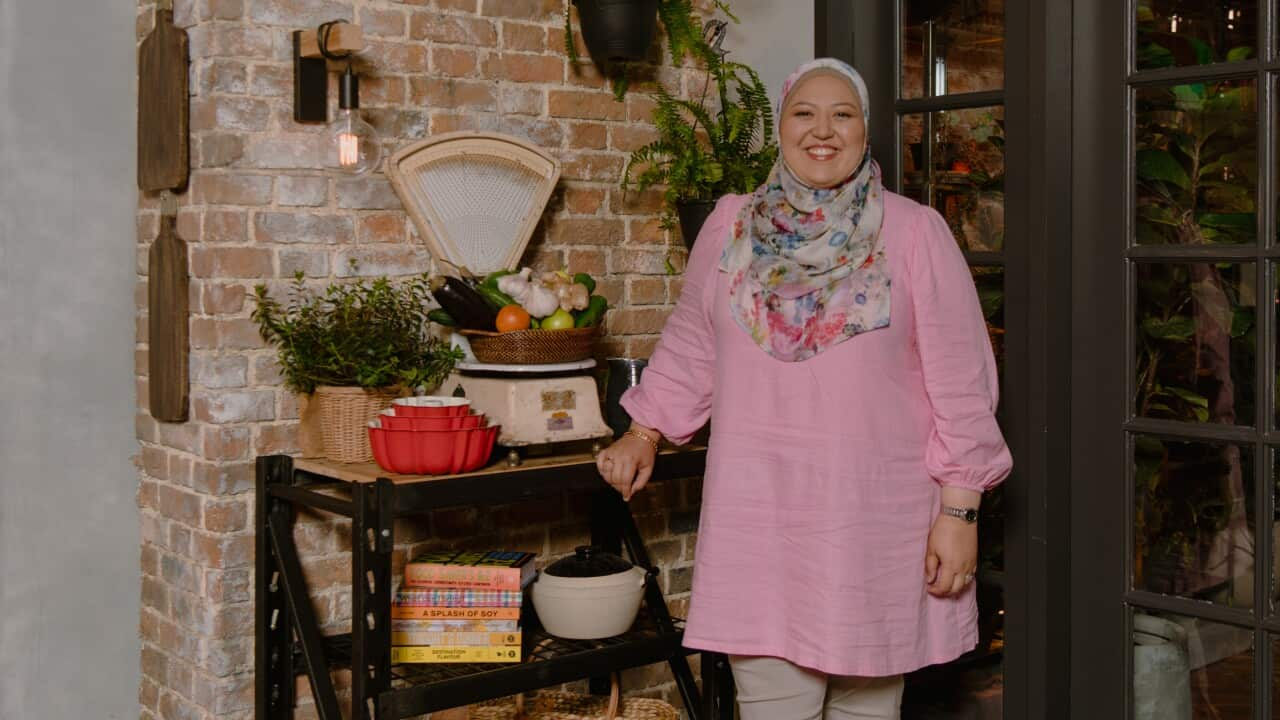Stream free On Demand

Celebrating Eid
episode • The Cook Up with Adam Liaw • cooking • 24m
G
episode • The Cook Up with Adam Liaw • cooking • 24m
G
When – a proud Muslim woman, cookbook author and former – first moved to Sydney from Saudi Arabia in 1989 at age four, Australia was a very different place.
was a new food trend; young; and had relatively recently become formalised as a national policy.
Australia was on its way to becoming more culturally diverse. But according to Elshafei, it still had a long way to go to demonstrate greater religious diversity. “There’s multiculturalism and then there’s diversity of religions,” says Elshafei, who was born to a . “Back then, there was not a wide-spread understanding of [diverse] religious festivals. For example, Eid al-Fitr was not very well known by non-Muslims.”

Amina Elshafei as a young girl in Sydney, Australia. She's all dressed up and about celebrate Eid with her family by eating a special seafood lunch.
These days, it’s common for local mosques across Sydney to hold morning Eid prayers in large parks and communal spaces to accommodate the growing population of observant Muslims in attendance. However, the cook recalls, decades ago gatherings were less in number and public prayer spaces were a lot smaller.
“Over the years, the number of Islamic people in communities across Sydney have grown exponentially,” she says. “There has also been a huge shift in community-wide awareness of the Muslim faith.”

Cookbook author and former MasterChef alumni, Amina Elshafei, reflects on how Eid celebrations in Australia have changed since she first moved to Sydney from Saudi Arabia in 1989.
The availability of authentic ingredients needed to make traditional foods for Eid was also limited in comparison to modern times.
“There was only one Middle Eastern grocer in Campsie, where we lived initially,” says Elshafei, who appeared on MasterChef in 2012 and 2020. “My father used to say that he missed the food of his home.
My father used to say that he missed the food of his home.
“We couldn’t source small okra here. [Authentic, hand-made] Turkish delight was really hard to find, unless you went to Auburn as there was one place there that made it. Apricot leathers, which we use to make a special drink during Ramadan, were not commonly available. We also couldn’t buy a lot of Middle Eastern herbs and spices.”
In stark contrast, Elshafei says modern Sydney is flooded with Middle Eastern shops. “There’s so much choice. Over the years, we’ve seen a big increase in the number of Middle Eastern grocers and halal butchers across Sydney. That’s definitely made traditional cooking and celebrations like Eid so much easier.”
Changing Eid celebrations
Elshafei’s Eid celebrations have also changed over the years, in a way that’s common to many migrant families.
“When I was very young, it was just the four of us – my parents, myself and my sister. Without a big community, we created our own way to celebrate Eid.”
In Elshafei’s household, breakfast on the morning of Eid was small but meaningful. Lunch, however, was the bigger event. “We would go out for a nice lunch and have seafood or eat at a nice hotel.”
As an adult, her community has grown. Elshafei is now married with two children (who are first-generation Australian). She also has large network of friends and family who observe Eid at the end of Ramadan.

Amina Elshafei bakes Egyptian biscuits called kahk to celebrate Eid al-Fitr every year.
A greater availability of Middle Eastern ingredients has also made traditional Eid breakfasts more accessible. On Eid morning, her family enjoys traditional foul (ful) or Lebanese manakeesh, a flatbread topped with za'atar, lemon and sumac, cheese or spiced minced meat.
“I grew up celebrating Eid on just one day. But for us now, it’s a full three days of celebrating which is more traditional. Our recognition of Eid has evolved within our household. We get together with our loved ones and eat an endless amount of sweets. We all have a lot of fun.”
Old recipes, new traditions
Elshafei has also created new traditions for her Australian-based family. Every year, she bakes Egyptian biscuits called kahk. She taught herself to make kahk as an adult using ingredients – like Turkish delight, placed in the centre of the sweet – that were not widely available in Sydney decades ago. “I want my family to keep this Egyptian tradition as it means a lot to me.”
As the home cook reflects on the past and observes the present, she feels positive. Elshafei is pleased at how religiously diverse Australia has become since her youth: “there is definitely really good momentum at the moment”.
She also looks forward to a future full of meaningful Eid celebrations, more happy ‘noise’ at family-gatherings, more manakeesh and more kahk biscuits.
“It’s been really nice for our kids to grow up with a greater awareness of [Islamic observances like Eid]. Awareness has grown both, within our home and across entire communities.
“…But there is always room for more community awareness.”



